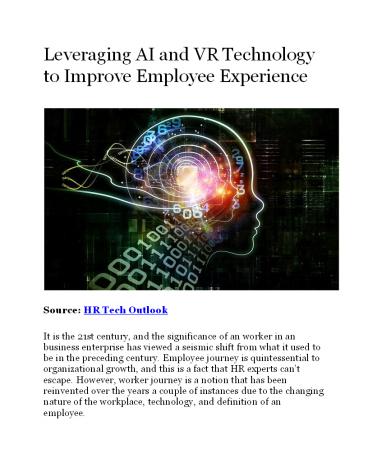Leveraging AI and VR Technology to Improve Employee Experience - PowerPoint PPT Presentation
Title:
Leveraging AI and VR Technology to Improve Employee Experience
Description:
There are a large number of employees today who work from remote locations or work on a project basis. This makes it difficult for HR professionals to define and measure employee experience regarding such employees. – PowerPoint PPT presentation
Number of Views:50
Title: Leveraging AI and VR Technology to Improve Employee Experience
1
Leveraging AI and VR Technology to Improve
Employee Experience
Source HR Tech Outlook It is the 21st century,
and the significance of an worker in an business
enterprise has viewed a seismic shift from what
it used to be in the preceding century. Employee
journey is quintessential to organizational
growth, and this is a fact that HR experts cant
escape. However, worker journey is a notion that
has been reinvented over the years a couple of
instances due to the changing nature of the
workplace, technology, and definition of an
employee.
2
There are a large range of personnel these days
who work from far flung areas or work on a
challenge basis. This makes it difficult for HR
professionals to define and measure employee trip
concerning such employees. These questions and
greater can be addressed with the
commercialization of Artificial Intelligence (AI)
and Virtual Reality (VR) technology. Traditional
technologies were used to automate HR approaches
and features however frequently neglected the
end-user, the employee. From HR Tasks to
Holistic Employee Management Deciphering
employees data to assist realize anomalies,
confirm background, predict attrition patterns,
and customise content material are some of the
imperative HR duties that benefit the use of AI
technologies. However, these improvements in
efficiency have little affect on employee
experience. The new wave of AI technology is
rapidly breaking into each and every part of
human capital management, placing new benchmarks
for the role of AI in human beings
strategy. Technology is only going to get
smarter, and this will help in solving extra
complicated cognitive tasks in the future. This,
in turn, will carry a more holistic adoption of
deep gaining knowledge of to apprehend the
worker higher and furnish customized experiences
in the workplace. Personalize Employee
Experience Career aspirations, gaining knowledge
of choices, and revenue expectations will soon
be mentioned with chatbots at tea breaks.
Advanced applied sciences such as speech
consciousness have grow to be savvier with the
creation of deep learning. Voice consciousness
will quickly be in a position to comprehend more
than a few accents and mimic human voice
effectively, which
3
makes it extra suitable for a couple of HR
functions. Natural Language Programming (NLP)
can help extract statistics from speech
accurately, draw data-driven text to provide
insights, thereby increasing the accuracy of
these insights. Personalization is feasible in
each experimental facet of an employees
lifecycle with the help of AI. It is not long
before AI becomes mainstream across all
industries and is on hand and accessible for
organizations of all sizes. The employees
workplace experience starts when they use their
biometrics to enter into their workplace.
Preferences for light and temperature settings
can be pre-fed into the system, and personnel
can be welcomed with a drink of their choice. The
dashboard may already be open with the most
tasks most labored on by using an employee. This
day is not too far, and the developments in AI
technological know-how have made it a reality
already across many components of the
globe. Robots to the Rescue Firing an employee,
dealing with emotional upheavals, and addressing
sensitive subjects are all soiled jobs that no HR
expert wishes to deal with. The good news is
they can soon wash these duties off their hands
thanks to the unexpectedly growing robot
technology. Humans are one of the most modern
and, at the equal time, lazy species of all.
Almost each and every venture that people are
responsible for can now be performed with a
single click on on an application. Small and
mid-sized companies are frequently sluggish when
it comes to adopting AI in HR functions. However,
the rapid expansion of AI across various sectors
has spread into the HR sector as well, to the
extent that AI is transforming every
4
primary function in HR ranging from recruitment,
talent retention, employee engagement, and
learning development too. The technology has
played a significant role in making HR functions
agile, enabling business leaders to take quick
and efficient, data-driven decisions. Machines
are taking over repetitive and analytical HR
tasks means HR leaders have more time on their
hands. Using this time to have quality
conversations with employees can help create a
comfortable workplace. News Source Leveraging AI
and VR Technology to Improve Employee Experience

